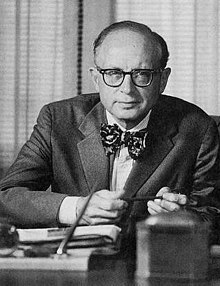Daniel J. Boorstin | |
|---|---|
 | |
| 12th Librarian of Congress | |
| In office November 12, 1975 – September 14, 1987 | |
| President | Gerald Ford Jimmy Carter Ronald Reagan |
| Preceded by | Lawrence Quincy Mumford |
| Succeeded by | James Billington |
| Personal details | |
| Born | Daniel Joseph Boorstin October 1, 1914 Atlanta, Georgia, U.S. |
| Died | February 28, 2004 (aged 89) Washington, D.C., U.S. |
| Spouse |
Ruth Frankel (m. 1941) |
| Children | 3 |
| Relatives | Julia Boorstin (granddaughter) |
| Education | Harvard University (BA) Balliol College, Oxford (BA, BCL) Yale University (SJD) |
| Awards | Pulitzer Prize for History (1974) |
| This article is part of a series on |
| Conservatism in the United States |
|---|
 |
Daniel Joseph Boorstin (October 1, 1914 – February 28, 2004) was an American historian at the University of Chicago who wrote on many topics in American and world history.[2] He was appointed the twelfth Librarian of the United States Congress in 1975 and served until 1987. He was instrumental in the creation of the Center for the Book at the Library of Congress.[2][3]
Repudiating his youthful membership in the Communist Party, Boorstin became a political conservative and a prominent exponent of consensus history. He argued in The Genius of American Politics (1953) that ideology, propaganda, and political theory are foreign to America. His writings were often seen, along with those of historians such as Richard Hofstadter, Louis Hartz and Clinton Rossiter, as belonging to the "consensus school", which emphasized the unity of the American people and downplayed class and social conflict. Boorstin especially praised inventors and entrepreneurs as central to the American success story.[4][5]
- ^ Wilson, Linda D. "Boorstin, Daniel J. (1914-2004)". Oklahoma Historical Society. Retrieved November 24, 2023.
- ^ a b "Daniel J. Boorstin". Encyclopaedia Britannica. Archived from the original on October 16, 2022. Retrieved November 9, 2022.
- ^ Cole, John Y (September 1, 2004). "In Memoriam Daniel J Boorstin (1914-2004)". Perspectives on History. Archived from the original on November 10, 2022. Retrieved November 9, 2022.
- ^ Alan J. Levine (2011). Bad Old Days: The Myth of the 1950s. Transaction Publishers. pp. 81–82. ISBN 9781412811972.
- ^ Pole (1969)